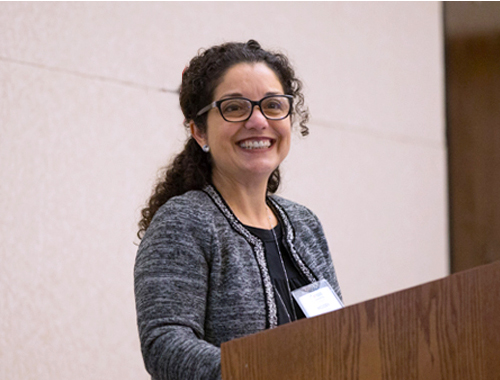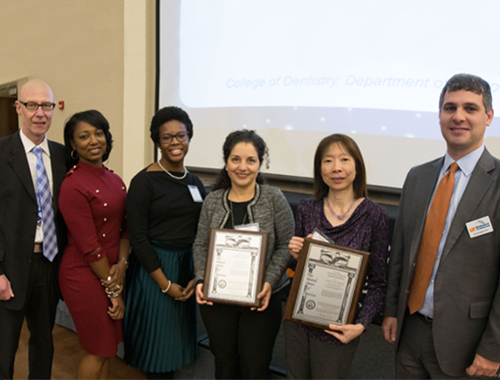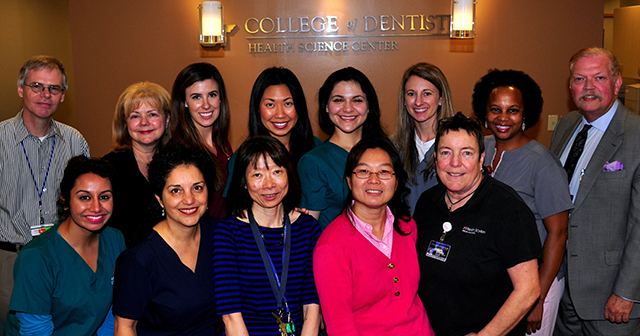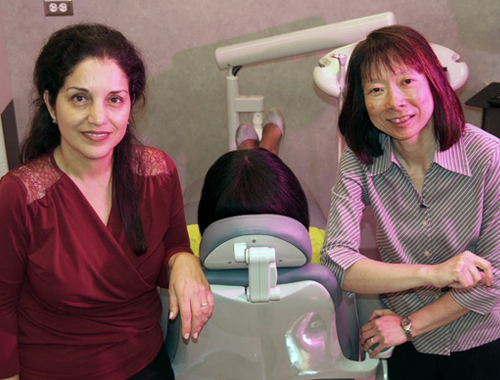
Dr. Mojdeh Dehghan, DDS is an Associate Professor and Associate Director, Division of Esthetic Dentistry in the Department of Restorative Dentistry at the University of Tennessee Health Science Center (UTHSC) College of Dentistry. Dr. Dehghan graduated from the Baylor College of Dentistry in 1990 and soon after moved to Memphis, Tennessee to join a private dental practice. She started at UTHSC in 1992 as a volunteer faculty member, moved to part-time in 2005, and joined UTHSC as a full-time tenure-track professor in 2011. Dr. Dehghan continues to work in private practice, where she has more than 26 years of experience.
Several years after Dr. Dehghan started working in private practice, she began to see and treat young patients who suffered from eating disorders, such as bulimia. These patients were experiencing severe erosion of their tooth enamel due to stomach acid exposure and required treatment ranging from multiple crowns to full mouth restoration.
The stigma and secrecy surrounding eating disorders can make patients reluctant to disclose their conditions to their dentists who, in turn, often shy away from discussing this topic. As a result, acid erosion can go unchecked until it reaches advanced stages. At the time, no treatment protocol existed for treating acid erosion in this special patient population. This left many in the dental profession, including Dr. Dehghan, frustrated. There had to be a better way to care for these patients.


After Dr. Dehghan joined UTHSC full time, she teamed up with Dr. Daranee Versluis, DDS, Associate Professor, Restorative Dentistry, to identify products on the market that could be used to help these special patients. Their research led them to develop a safe-to-use, two-step mouthwash that neutralized acidic saliva and significantly rehardened softened enamel. A patent was filed for the mouthwash in 2013 and was granted in 2017.
In 2014, Dr. Dehghan received the Proctor and Gamble/Gillette Hayden Memorial Foundation Research Award from the American Association of Women Dentists for her work. The award came with a $10,000 grant that enabled her and Dr. Versluis to assemble a multidisciplinary team from UTHSC to conduct a pilot clinical study at The Transformation Center, a rehabilitation and treatment center for patients with eating disorders in Cordova, Tennessee. This allowed the team to work directly with their target population, testing the mouthwash on patients and gathering information from them concerning their purging behaviors and oral hygiene habits. Results from the clinical study showed the mouthwash was more effective at reducing acid in the mouth compared to products already on the market. The mouthwash was also shown to reharden acid-softened enamel in a laboratory study.
In 2016, Dr. Dehghan took her research one step further. She received a University of Tennessee Research Foundation (UTRF) Maturation Fund grant to begin work on a more accessible delivery system that would treat acid erosion just as effectively as the mouthwash. For this, she teamed up with Dr. Hassan Almoazen from the Department of Pharmaceutical Sciences in the UTHSC College of Pharmacy.
Their collaboration resulted in a multi-layer lollipop that proved to be effective at neutralizing acid and rehardening enamel, maybe even more so than the mouthwash since its neutralizing effect happens in less than a minute and it stays in the mouth longer, thus enhancing its rehardening effect. The lollipop is also more readily available for patients and can easily be slipped into a purse or bag to be used anytime, anywhere. UTRF filed for a patent on the lollipop in 2017 and Dr. Dehghan plans to conduct a clinical trial at several rehabilitation centers to measure its effectiveness. She also plans to conduct stability tests to see whether the lollipop’s effectiveness decreases over time.
For Dr. Dehghan, there is more to her research than simply product development. She also wants to create awareness in the dental profession about the impact of eating disorders on tooth erosion, the importance of early detection, and the need to recommend appropriate home care for patients. In addition to treating patients with eating disorders, Dr. Dehghan sees the mouthwash and lollipop being used by people with acid reflux, pregnant women with morning sickness, individuals with migraines, and cancer patients receiving chemotherapy, all of whom are at risk of tooth erosion from stomach acid exposure.

Dr. Dehghan is thankful for the support she has received from UTRF throughout this research project. When she first approached UTRF about a patent for the mouthwash, she had no idea what steps were involved in the application process. UTRF not only helped her file a patent application but also helped her make connections with other UTHSC colleagues to further her work, including her collaboration with Dr. Almoazen. Dr. Dehghan also benefited from guidance provided by UTRF Entrepreneur-in-Residence Chris West, who provided business insight into how to approach companies and develop a long-term vision for the product.
Dr. Dehghan is equally thankful for the support she has received from her UTHSC colleagues and the University of Tennessee College of Dentistry Alumni Endowment, which provided initial funding for her research. Many of her colleagues were motivated to work on this project since the topic of eating disorders had touched them in some way. Working at UTHSC made it easy for Dr. Dehghan to build a research team that crossed multiple disciplines in medicine and pharmaceutical sciences.
